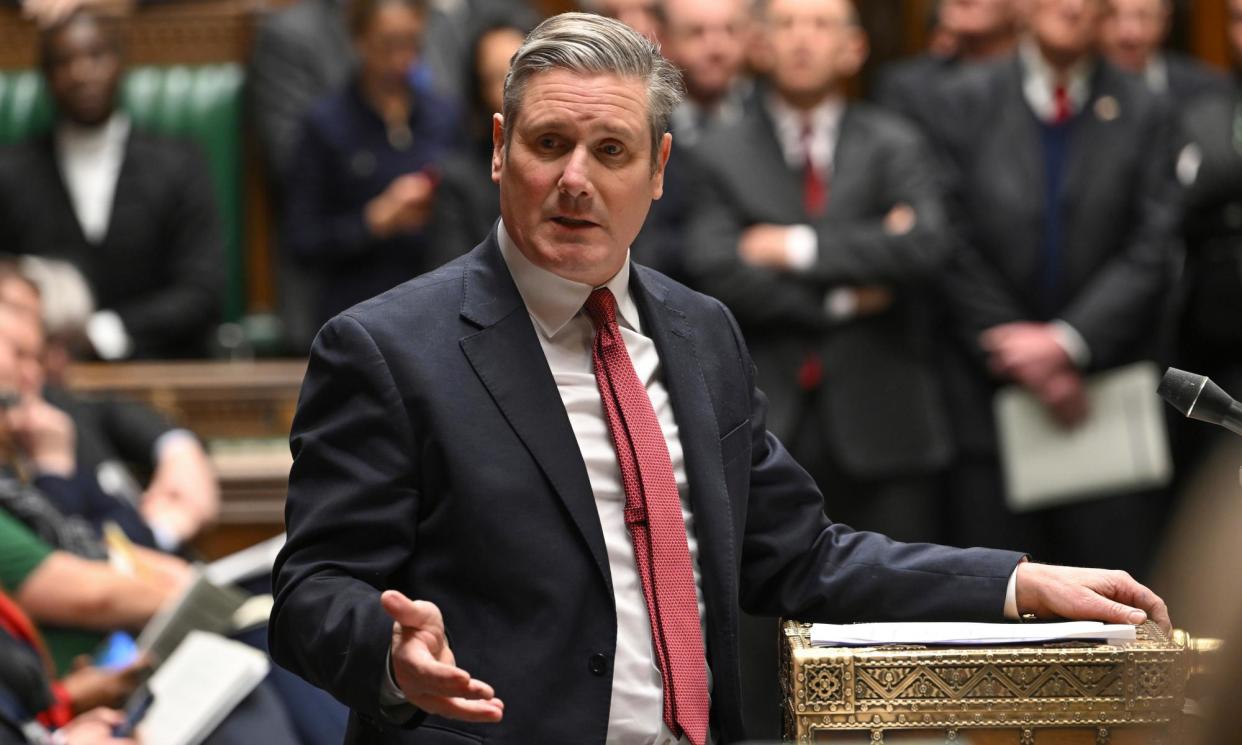Labour calls for ‘immediate humanitarian ceasefire’ in Gaza

Labour has called for “an immediate humanitarian ceasefire” in Gaza for the first time in an attempt to head off what threatens to be the biggest rebellion against Keir Starmer since he became party leader.
Opposition whips published a 237-word amendment to a Scottish National party motion on Tuesday setting out the party’s stance on the Middle East crisis, which they hope Labour MPs will back instead of a separate amendment from the SNP calling more bluntly for an immediate ceasefire.
The Labour wording goes further than the party has in the past in calling for a ceasefire. Last weekend, Starmer said he wanted the fighting to “stop now”, but he has been reluctant to back an immediate and permanent ceasefire given that Hamas has threatened to carry out further attacks like the one on 7 October.
Related: Keir Starmer risks biggest rebellion of his leadership over Gaza vote, MPs warn
While the amendment backs a “humanitarian ceasefire”, it clarifies that it does not want Israel to stop fighting as long as Hamas continues to threaten violence.
The amendment calls for “an immediate humanitarian ceasefire, which means an immediate stop to the fighting and a ceasefire that lasts and is observed by all sides, noting that Israel cannot be expected to cease fighting if Hamas continues with violence and that Israelis have the right to the assurance that the horror of 7th October cannot happen again”.
It also calls on the Israelis not to enter Rafah, where 1.5 million people are sheltering; for aid to be allowed to enter Gaza; for Israeli settler violence to end, and for a diplomatic effort towards a two-state solution.
David Lammy, the shadow foreign secretary, said: “This is a comprehensive motion and one that I hope the whole house can get behind.”
Labour’s amendment, which will be put to a vote on Wednesday, is designed to head off the type of rebellion the party suffered in November, when 56 Labour MPs, including eight frontbenchers, defied Starmer’s orders not to vote for a similar SNP motion.
Labour MPs have said in recent days that there could be an even bigger rebellion this week if Labour whips try again to prevent them voting for a ceasefire.
Initial reactions suggested the party’s shift in policy would be enough to persuade some of those who rebelled last year not to do so again. But it remained unclear what Labour would do if the amendment failed to pass.
Clive Betts, one of dozens of Labour backbenchers who voted for the SNP motion last time, told the BBC’s World at One: “It is a revised and good position. I don’t think anyone can see the horrors of what is happening now in Gaza and not want the fighting to stop, and stop immediately. That is what the Labour motion says.”
Another Labour source said: “The amendment looks good, but we’ll have to see how they handle the vote on Wednesday.”
The shift in Labour’s position comes amid a similar change in international opinion towards events in Gaza.
The US on Monday proposed a UN security council resolution calling for a temporary ceasefire and urging Israel not to go ahead with a planned offensive on Rafah in southern Gaza. The draft resolution marks the first time Washington has explicitly backed a ceasefire in the region, though it also says it should begin “as soon as practicable”, rather than immediately.
Meanwhile the Prince of Wales called for the fighting to end “as soon as possible” and for more humanitarian support for Gaza.
Prince William issued a statement before carrying out visits to recognise the human suffering caused by conflict in the Middle East and the global rise in antisemitism.
“I remain deeply concerned about the terrible human cost of the conflict in the Middle East since the Hamas terrorist attack on October 7. Too many have been killed,” he said.
“I, like so many others, want to see an end to the fighting as soon as possible. There is a desperate need for increased humanitarian support to Gaza. It’s critical that aid gets in and the hostages are released.
“Sometimes it is only when faced with the sheer scale of human suffering that the importance of permanent peace is brought home.
“Even in the darkest hour, we must not succumb to the counsel of despair. I continue to cling to the hope that a brighter future can be found and I refuse to give up on that.”

 Yahoo News
Yahoo News 
